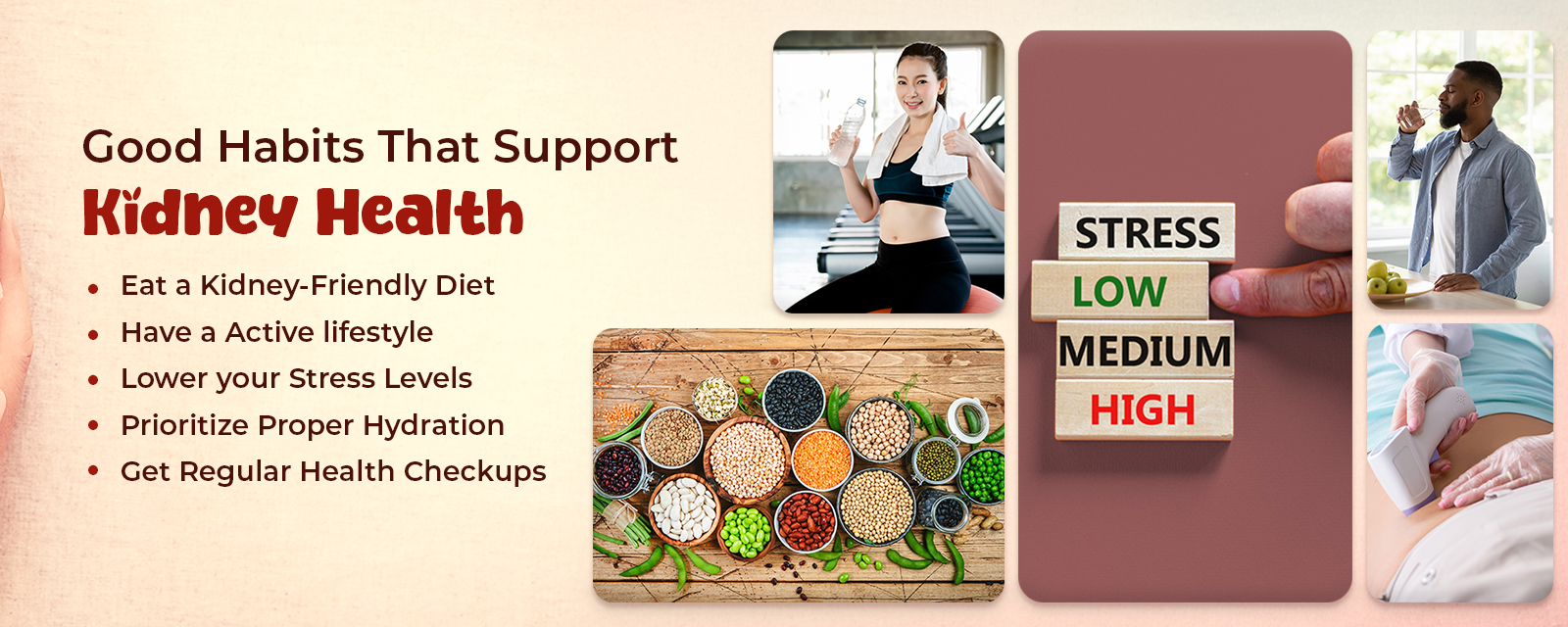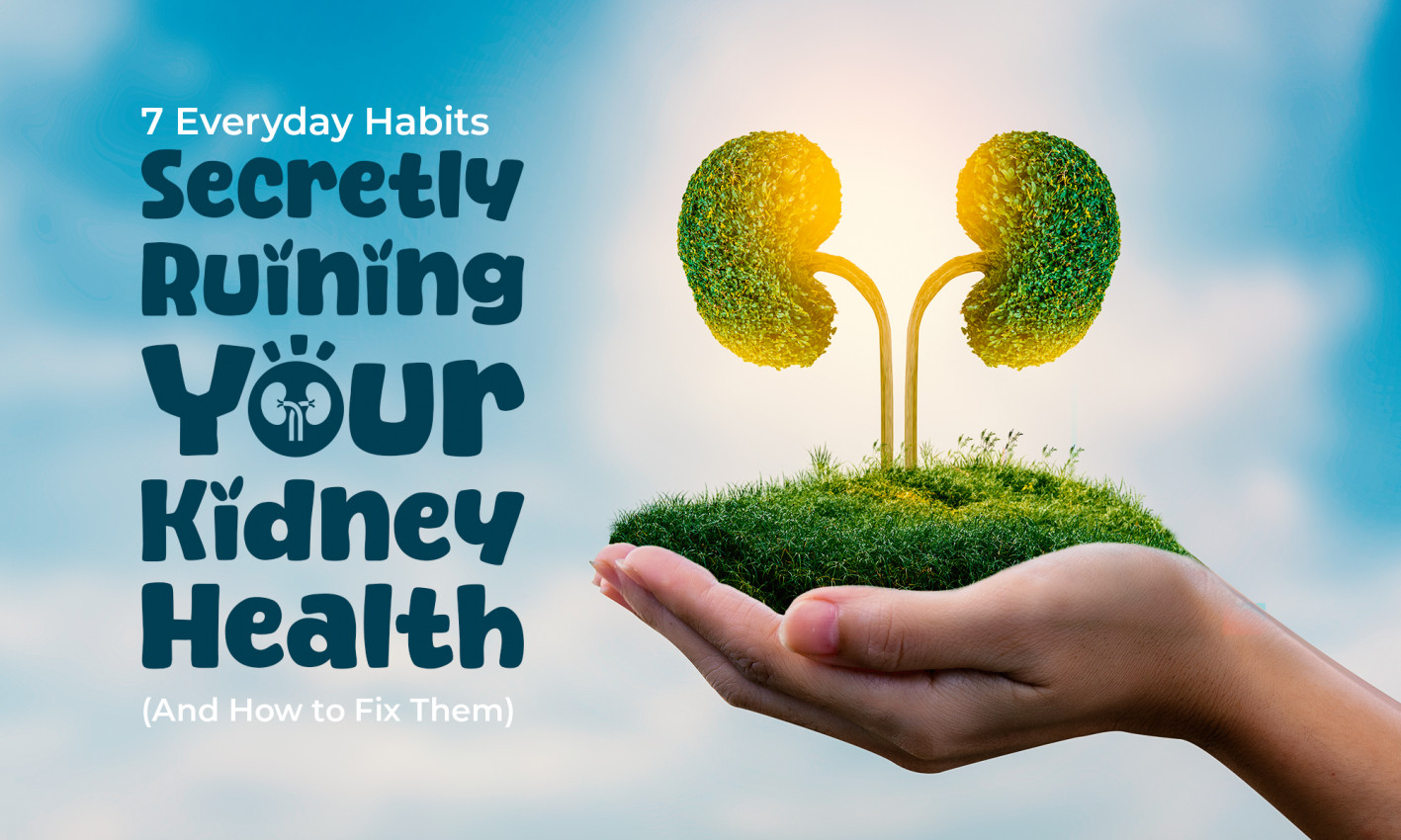Your kidneys work hard every day, filtering waste, balancing the fluids, and regulating your blood pressure.
Yet we unknowingly have habits that slowly damage our kidneys over time.
Small daily habits like skipping water, ignoring high blood pressure, and using excessive painkillers can set the stage for serious damage.
In this blog, we’ll explore some of the most common habits that harm kidneys and how to fix them.
Because prevention is better than cure when it comes to kidney health.
|
Table of Contents:
|
Proper Hydration:
One of the simplest yet most damaging habits is inadequate hydration.
When you don’t drink enough water, your kidneys can’t flush out toxins effectively, increasing the risk of kidney stones, urinary tract infections, and long-term damage.
Experts suggest having enough water so that your urine volume is at least 2.5 litres a day to prevent any stone formation.
What to do: Sip water steadily through the day, increase intake in hot weather or during exercise, and aim for clear or pale-yellow urine as a sign of good hydration.
Overusing NSAIDs / Painkillers:
Painkillers like combiflam, ibuprofen, paracetamol, or other NSAIDs can provide relief, but overuse is a major culprit in kidney damage.
These drugs reduce blood flow to your kidneys, especially during dehydration or in people having kidney disease.
Studies show that long-term or high-dose NSAID use is linked to a decline in kidney function and higher incidence of acute kidney injury and chronic kidney disease.
What to do: Avoid self-medicating with painkillers frequently. If needed, use the lowest dose for a shorter time and always consult a doctor if you have underlying conditions like diabetes, high blood pressure, or already compromised kidney function.
Excessive Salt, Sugar, and Processed Foods:
High sodium intake is linked to elevated blood pressure, which can strain your kidneys.
Similarly, too much added sugar can contribute to fat buildup, obesity, and diabetes - two of the biggest risk factors for chronic kidney disease (CKD).
Many processed & packaged foods like sauces, snacks, breakfast cereals, and drinks hide excess salt and sugar behind confusing names.
What to do for CKD prevention: Read food labels, cut down on processed snacks, choose fresh whole foods (vegetables, lean proteins, whole grains), and reduce added sugar and table salt.
Read More: 10 Foods to Lower Your Blood Sugar
Poor Toilet & Sleep Habits:
You may think that sleep has nothing to do with your kidneys - but it plays a major role in your kidney health.
Inadequate or poor-quality sleep increases stress, raises blood pressure, and impairs kidney function.
Meanwhile, holding urine for too long adds pressure to your bladder and urinary tract and can eventually affect kidney health.
What to do: Go to the toilet when you need to. Establish a 7-8 hours uninterrupted sleep routine, and minimize exposure to blue light before bedtime.
Ignoring Hypertension & Diabetes:
Some of the most dangerous habits that lead to chronic kidney disease is not taking care of high blood pressure or diabetes.
Both damage the tiny blood vessels in your kidneys over time, reducing filtration capacity and eventually harming kidney health.
What to do: Have regular medical checkups, monitor blood pressure and blood sugar, adhere to medications if prescribed, and adopt lifestyle changes (diet, exercise) to keep numbers in safe ranges.
Good Habits That Support Kidney Health:

While avoiding harmful habits is significant, practicing healthy habits actively strengthens and protects your kidneys. Here are some evidence-based practices to adopt for CKD prevention:
- Eat a Kidney-Friendly Diet: A balanced diet, rich in fruits, vegetables, proteins, and whole grains supports kidney health.
- Have an Active Lifestyle: Regular exercise helps control weight, lowers blood pressure, and improves insulin sensitivity, all of which are prime contributors to chronic kidney disease.
- Lower Your Stress Levels: High cortisol levels due to chronic stress can raise blood pressure and blood sugar, indirectly harming your kidneys.
- Prioritize Proper Hydration: Consistently having enough water helps your kidneys flush out toxins and regulate electrolyte balance.
- Get Regular Health Checkups: Early detection of kidney issues makes treatment much easier.
Conclusion:
Your kidneys do so much silently and tirelessly - you owe them more than neglect.
The habits you build today - drinking enough water, avoiding unnecessary NSAIDs, managing salt and sugar, tending to sleep and chronic conditions - will determine how healthy and strong they remain tomorrow.
By making small but consistent changes, you can protect your kidney health and avoid having to treat problems later.
Start with one habit this week - maybe carry water, check your salt intake, or set a time to go to bed - and build from there.







